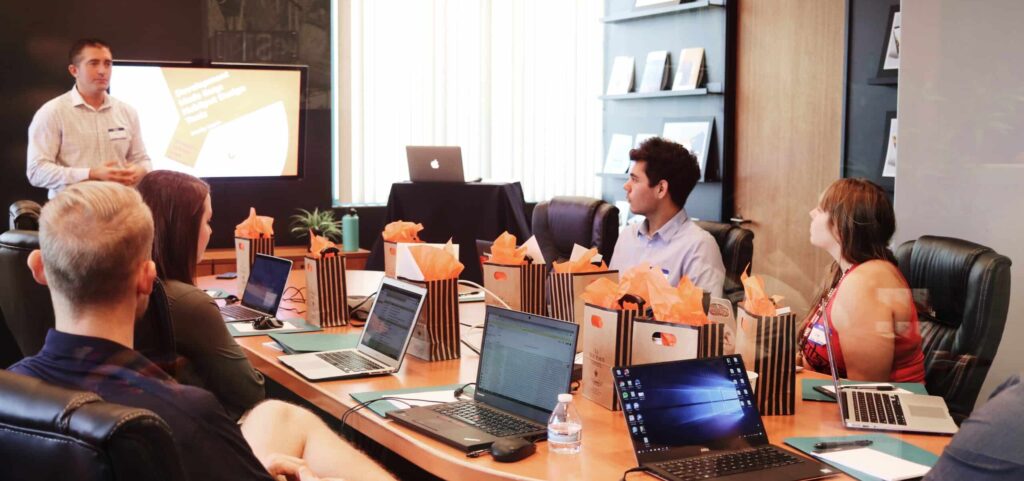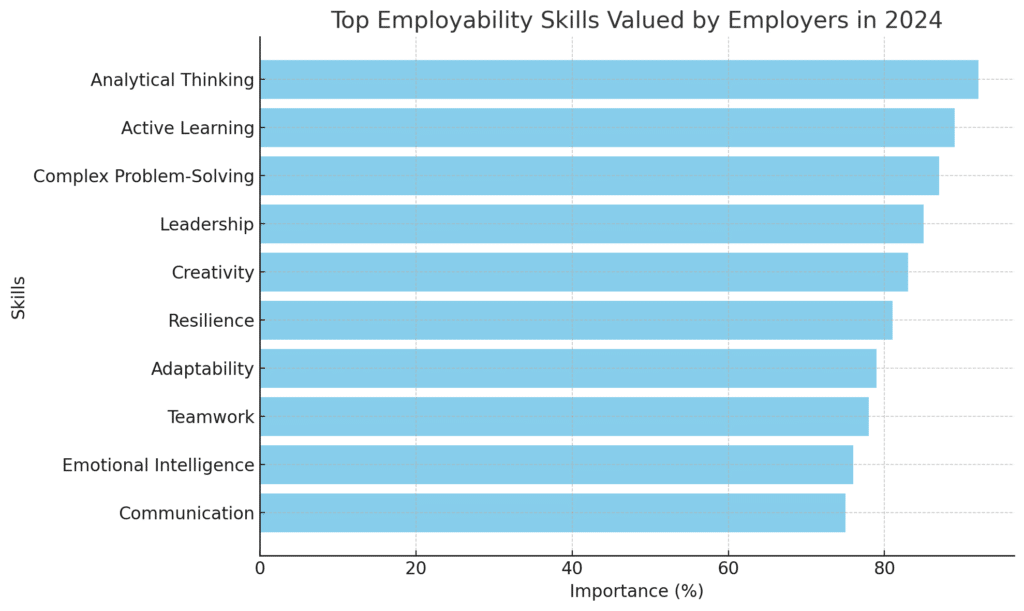As the global workforce changes, helping students gain the skills, experiences, and flexibility they need to succeed has never been more important. Boosting student employability is a major priority for educators, especially in higher education.
This guide, insightfully crafted by Practera, dives into pragmatic and constructive strategies to improve higher education learner employability in 2024-25. The guide also provides insights and solutions from proven programs and case studies from various global employability programs implemented by Team Practera.
The guide is easy to read and has many action points for you to implement in your institutional environment. You can also reach Team Practera at any point in your journey to help you with your student employability needs.
Why Improve Student Employability?
Employability isn’t just about landing a job—it’s about preparing students to thrive in today’s complex workplaces. Employers are looking for people who are skilled, adaptable, collaborative, and creative.
The World Economic Forum’s Future of Jobs Report shows that skills like critical thinking, problem-solving, and self-management are increasingly essential. By adding employability-focused strategies to education, educators can bridge the gap between academic learning and real-world needs, helping students succeed in their careers.
Understanding Employability Skills
Employability skills, commonly known as “soft skills” or “translatable skills,” are the necessary abilities that allow people to function properly in numerous workplaces. These are job-agnostic skills that are desired in every industry, and the need will only grow. Some of the key employability skills are:
Communicating: Being able to transmit ideas in a meaningful way.
Collaboration: Working effectively with others to meet shared goals.
Problem Solving: Finding the problems and solving them.
Flexible: The ability to change as per the situation and maintain a positive approach.
Leadership: Guiding and inspiring others towards success.
These skills are crucial as they enhance an individual’s capacity to contribute positively in the workplace, regardless of their role or industry.

Why are employability skills important from an employer’s perspective?
Employability skills are often more valued by employers than academic perfection. Academic performance is a critical marker of intelligence, but the application of skills in practice, the ability to work as a team, and the adoption of proactivity are key.
A study published in the International Journal of Academe and Industry Research revealed that employers place a greater emphasis on essential skills like leadership, communication, and interpersonal skills instead of formal qualifications.
The World Economic Forum’s Future of Jobs Report paints a similar picture, with analytical thinking and creative thinking ranking among the top skills through 2027.
This is important to employers because it indicates the potential of an employee to:
Navigate Complex Work Environments: Employability Skills allow individuals to respond to a wide range of work situations.
Fuel Innovation: Innovative solutions stem from creative thinking and problem-solving.
Improve Team Dynamics: Good communication creates a culture of teamwork.
Thus, these are the skills that students need to develop so as to ensure that they meet employer expectations and excel in their careers.
Strategies to Boost Employability
1. Hands-On Learning Programs
Hands-on learning connects classroom knowledge to real-world experiences. Examples include internships, industry projects, and teamwork challenges.
How Practera Helps
Practera’s platform helps educators design and manage hands-on learning programs. It supports collaboration with industry partners, gives real-time feedback, and offers insights into what’s working.

Case Study: King’s Business School Global Industry Project
King’s College London worked with Practera to run team-based consultancy projects for 50 employers and 300 students. The experience was remote but made a big impact.
2. Teach Skills Beyond the Classroom
Employers care about skills like teamwork, problem-solving, and communication—just as much as technical know-how.
Practera’s Solution
Practera supports skill-building through project-based learning. Its tools give students personalized feedback to help them improve in real time.

Case Study: LSE Skills Accelerator
The London School of Economics (LSE) and Practera created a virtual program that helped students grow their professional skills through hands-on modules and real industry projects.

3. Build Industry Connections
Strong ties with industry partners give students real-world exposure and a better understanding of workplace expectations.
Practera in Action
Practera connects educators with a network of industry professionals for real-world industry experiences for their learners, mentorships, and collaborative projects.

Case Study: Study Australia Industry Experience Program
In collaboration with Practera Study Australia, built a low-cost Industry experience program that paired international students with local organizations for two-week business projects. Discover more about the Practera-powered initiative.
4. Use Data to Improve Outcomes
Data can help educators adjust programs to better meet industry needs and fill skill gaps.
Practera’s Analytics
Practera offers detailed analytics on student engagement, skill growth, and program success, helping educators make smarter decisions.

5. Promote Lifelong Learning
Preparing students for a dynamic job market means encouraging continuous learning and adaptability.
How Practera Fits In
Practera’s tools help educators add the latest trends and technologies to their programs, keeping students ready for what’s next.
6. Career-Readiness Workshops
Resume workshops, interview practice, and networking events can help students feel more prepared for the workforce.
Practera’s Role
Practera makes it easy to include career-readiness activities in broader employability programs.
Additional Tips for Educators
Encourage Networking: Create events where students meet professionals.
Share Success Stories: Highlight students who’ve grown through employability programs.
Engage Alumni: Tap into alumni networks for mentorship and advice.
Practera’s Role in Student Employability
Practera offers flexible, scalable solutions for educators to create programs that work for both students and industries. With Practera, you can:
Deliver real-world learning experiences.
Track results with data-driven insights.
Help students build the confidence to succeed in their careers.
Wrapping Up: Supporting Educators and Students
The workplace is evolving, and helping students become employable is key for educators. By adding hands-on learning, industry connections, skill-building, and lifelong learning, educators can make a real difference.

As the job market evolves, the importance of building employability through employability skills cannot be overstated. By focusing on developing these crucial competencies alongside academic knowledge, educators can significantly enhance their students’ career prospects. The graph below combines insights from – World Economic Forum – Future of Jobs Report (2023), National Association of Colleges and Employers (NACE), McKinsey Global Institute – Future of Work Skills, provide a comprehensive view of the top employability skills that employers value most in candidates entering the workforce in 2024. Analytical thinking ranks highest, with 92% of employers emphasizing its importance. This reflects the growing need for individuals who can interpret complex information and make data-driven decisions.
Active learning and complex problem-solving follow closely, showcasing the importance of adaptability and the ability to tackle multifaceted challenges. Leadership and creativity are also highly prized, reflecting the need for employees who can innovate and inspire teams.
Resilience, adaptability, teamwork, emotional intelligence, and communication round out the top skills, demonstrating that soft skills remain critical for workplace success. These skills help individuals collaborate effectively, manage stress, and contribute to a positive workplace culture.
This data underscores why educators must prioritize building these skills in students through experiential learning, professional development workshops, and industry partnerships. By fostering these competencies, students are better equipped to meet employer expectations and excel in their careers.
Partnering with Practera offers a powerful solution to scale employability skills programs effectively, ensuring graduates are well-prepared for the challenges of the modern workforce.
Ready to transform your approach to employability skills development? Contact Practera today to explore how we can help you prepare your students for career success.
Practera is here to support you every step of the way. When students graduate not just with knowledge but with experience and confidence, they’re set up to succeed in any job market.
Start improving your students’ employability today. Explore Practera’s Solutions.
